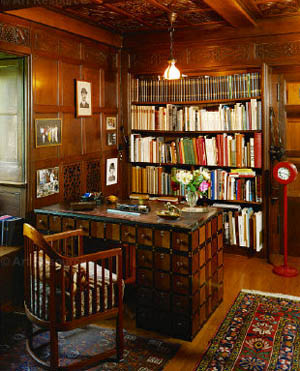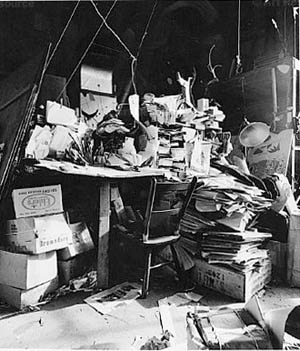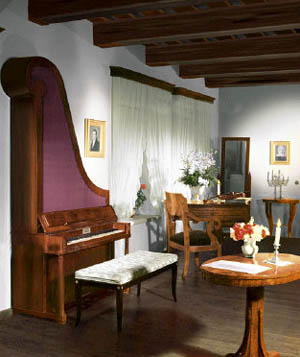 |
Formation of Children
The Importance of Order in Professional Life
Marian T. Horvat
Chapter V of the Small Manual of Civility extends the principles of order (Chapter IV) to the business life. After giving some interesting examples that illustrate the working models of the 1950s, which easily can be transferred to present day conditions, it stresses the value of instilling a sense of order from the earliest age for several reasons:
First, because it forms work habits that assure success in one’s undertakings in life;
Second, and more important, if a man maintains order in material things around him, he will have propensity to maintain order in his soul and ideas. Ordered thinking will influence his way of being.
Instead of becoming unkempt, disorganized and unmethodical, a man who loves order will have a calm and disciplined spirit. He will be capable of doing many and great things, especially if he is motivated by high ideals and love of God. How many “dreamers” plan great feats of counter-revolutionary action, but never accomplish anything because, lacking the spirit of initiative and order, their grand plans never materialize into concrete actions.
Order is what gives life and prosperity to every undertaking; disorder is the ruin and death of an enterprise.
In business accounts
In business and industry, order is not just a virtue, but an essential condition. What will be the fate of a business where there is no order in the bookkeeping? Here we are dealing not just with appearances of a more or less exact order, but rather the strictest precision. A log or accounts book should be very exact: to forget an inscription, to write a bookkeeping entry in the wrong place, to miscarry figures and leave out numbers is more serious than a mere negligence, it is a shortcoming that can have fatal consequences: loss of credit, downfall, decadence, and finally, destruction. Business and industry cannot admit or tolerate the lack of order.
In the office
We enter a workshop where various employers are working. The work space is carefully divided, each station with its requisite machines and equipment. Every employee has within reach the necessary tools and parts, ordered by section, group, size and quality. No time is lost in looking for items elsewhere, because each thing is in its place, always the same numbered place. Order and diligence reign in every section. For this reason, the work is well done, abundant and gainful.

The well organized office, above, gives a sense of calm and accomplishment. Below, the chaotic and cluttered office of modern artist Alexander Calder
 |
On a certain day, a new worker enters the office. He is a young man eager to work, energetic, honest and able. However he does not have the spirit of order. He uses any item within reach; he borrows equipment from his companions and then forgets to return them to their owners. In his work space, things gather and pile up in cluttered heaps, a situation that affects his co-workers who cannot find their things.
In several weeks, the office is in disorder. In the storeroom, everything is in disarray. The other workers are missing various work tools: files, planers, handsaws, hammers, nails, screws, etc. This is the moment when discussions, arguments, and reciprocal accusations begin. One becomes irritated with another, time is lost, and the bickering does not end. It is impossible to continue in this way. Either the new worker must change his ways, or he must leave. This measure is judicious, because a disordered man harms all those he works with.
In public services
In services related to public health, a meticulous and absolute order is imperative. In this branch, a careless order, a poorly written medical prescription, one formula confused for another, can have disastrous consequences. The sick or wounded man depends upon the promptness, order, and diligence of the caregivers and their assistants.
How many times in accidents and catastrophes, the assistance is less than what it should be because the material needed at that precise moment was missing or misplaced? A key was not in its spot, a medicine couldn’t be found; a surgical tool was lost and not replaced, and so on.
Likewise, a lack of order in airlines, railroads, shipping lines and telephone companies can cause very serious problems.
In public administration, order is not just a professional quality, but a pillar, a necessity of national life. Disorder in public services is the primary cause of the ruin of countries. There has to be order in finances, the army, educational and justice systems, in public works and in the police.
Order should be instilled early
Order is, therefore, of the highest importance. It should be practiced from an early age. Certain persons have the spirit of order instinctively. Entering a room, they cannot bear to see objects strewn on the ground; they pick them up and place them in their proper place. A cupboard or drawer is open; they close it. They have a sense of proportion and a genius for classification, assisted by a good memory.

Everything is in its place in the music room of Chopin's family house, above. Below, the simple but ordered desk of Blaise Pascal. The manuscript pages are from his work Defense of the Catholic Faith
 |
An ordered man is a precious help in a family. All have recourse to him, because he knows where the letters, the books, the paid bills, the utensils are.
A young man should be accustomed from his earliest years to order and method in life and regularity in work. There should be no clutter and confusion in his pockets, drawers, closets and work desk. Everything should be in its proper place.
Upon retiring for the night, his clothes should be laid out in a convenient place, within hand’s reach. He should have the habit of arranging anything that is out of its place, and cleaning what can be damaged by dust or humidity.
He should periodically clear out the papers and objects that fill the corners of certain rooms. What a mountain of useless items can collect in a closet, an unoccupied room, or on a work table, when it becomes the place to throw newspapers, magazines, books, letters, and various odds and ends.
Disorder in the government of material things easily generates a disorder or lack of government in ideas. The person who is accustomed to the spirit of order is generally calm, serene, always prompt, finishing his work at the right time; in the opposite sense, the disordered person is ordinarily nervous, agitated, late with his work, and everything badly done.
In addition to this, disorder generates ridicule, because it is ridiculous to see a man rummaging for the objects he needs, turning out his pockets, questioning others, running here and there. Who does not laugh to see the disheveled passenger who arrives at the station, flustered and panting, dropping his jumbled bags, his eyes bulging, his face flushed and wet with perspiration, only to find the train has already left? He is the victim of his own lack of order.
Order and an accomplished life
A life directed by the spirit of order is rich in useful works. The illustrious geologist George Cuvier, one of the most influential figures in science in the early 19th century, cultivated the spirit of order in every aspect of his work and life. He had a job marked for each hour, a particular cabinet for each type of work, and in this cabinet he kept everything necessary for that work: the specimens, books, designs, etc. This custom of constant order permitted him to realize the incomparable works that immortalized his name.
A 19th century statesman who accomplished enormous reforms in every branch of government and public institutions was Ecuadorian president Gabriel Garcia Moreno. In his daily rule of life, he made this notation: “Every morning before beginning my work, I will write down what I have to do, being very careful to distribute my time well, to give myself only to useful and necessary business, and to continue it with zeal and perseverance.”
Let us imitate a similar order so that our lives will produce abundant fruit. Let us assign a place to each object. Let us always return each object to its proper place and let us carry out each work at the appointed hour and in the time scheduled for it.

Posted October 17, 2006

Related Topics of Interest
 Order and the Spirit of Order Order and the Spirit of Order
 How to Sit, Stand, Walk How to Sit, Stand, Walk
 The Bearing The Bearing
 Dressing Well - Vanity or Virtue? Dressing Well - Vanity or Virtue?
 St. Isidore of Seville: the Importance of Being Dignified in Manners St. Isidore of Seville: the Importance of Being Dignified in Manners
 Four Ways to Discern a Man's Soul by His Appearance Four Ways to Discern a Man's Soul by His Appearance
 Why Do Only Women Have to Dress Well? Why Do Only Women Have to Dress Well?
 Tradition, Stagnation and Progress Tradition, Stagnation and Progress

Related Works of Interest
|
|
Formation | Cultural |
Home | Books | CDs
| Search | Contact Us
| Donate

© 2002- Tradition in Action, Inc. All Rights Reserved
|
 |
|